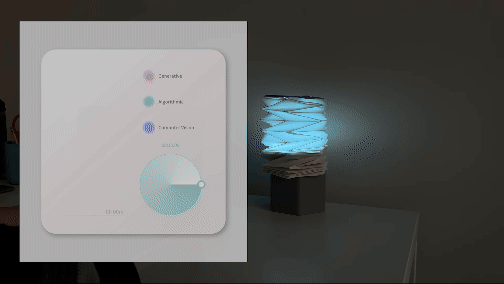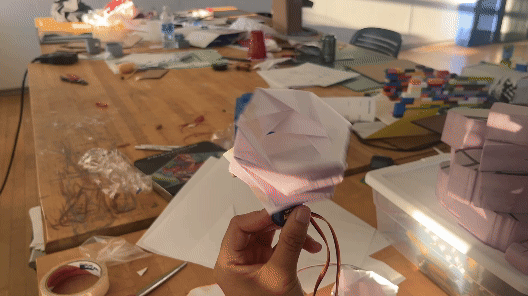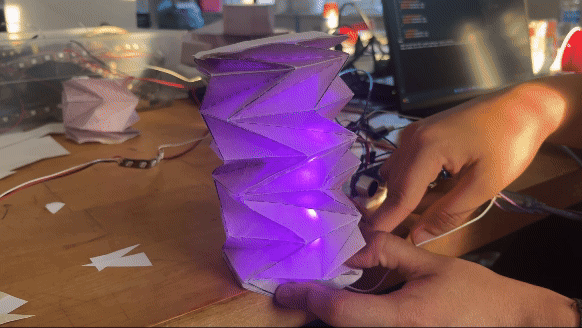
Orli
An interactive desk lamp that reflects AI’s behavior in response to our digital habits.
Collaborators: Sojung Pak and Joan Lee
Role: Interaction Designer, Creative Technologist
Duration: 4 weeks
Skills: Figma, Fusion, Rhino, After Effects, Python, Laser Cutting, 3D Printing
How might we be reflective of the usage of ai in our daily life by identifying how AI affects our digital habits?
As artificial intelligence increasingly permeates our daily environments, from our homes to our workplaces, it has become an integral part of our digital interactions. The concept of an interactive lamp serving as a self-probe emerged as a means to explore and illuminate AI's profound impact. This innovative approach aims to guide our understanding of how AI shapes our daily routines, ultimately enhancing our awareness of its pivotal role in our lives.

Estabilishing our goals
Using our research findings, we transformed key AI interaction insights into actionable design objectives, shaping the lamp’s interactions and behaviors accordingly.

Prototyping interactions
Experimenting with different behaviors like pulsing, rotating and vibrating to understand user interactions for a holistic experience.



The customization phase asks users to determine their preferred level of AI interaction, adding a personal touch to the product and experience.
.jpg)
Designing the different phases for the personalized interaction
%20(2).jpg)
The active phase determines how the AI responds to the frequency and manner of user interactions.
The passive phase reflects on the user's AI interactions throughout the day, providing insights into their engagement patterns.

The reflective phase evaluates long-term AI interaction patterns, showing how usage has influenced user behavior and engagement over time.
%20(3).jpg)
How Orli enhances our workflow?

Process
We designed a widget UI reflecting the lamp’s form and color, iterating to represent time effectively as an alarm.

The lamp was designed in Fusion 360, ensuring precise integration of moving parts and electronic components. It was 3D printed using PLA, with optimized structural splits for easy assembly. The design accommodated sensor placements and light diffusion for functional aesthetics.


Developing the technical system
An Arduino controlled servo motors for rotation, a linear actuator for vertical movement, and an LED ring for dynamic lighting. An ultrasonic sensor detected hand presence for the snooze function. The system was programmed to sync movements and colors with user interactions.
.jpg)







Future Consideration
Future considerations for the project include examining more complex aspects of AI behavior to enhance its responsiveness and adaptability. We plan to gather data from a larger user base to compare usage trends on a broader scale, providing deeper insights into user interactions. Additionally, we will create detailed personas based on this usage data to better understand and cater to different user needs and preferences, ensuring a more personalized and effective experience.